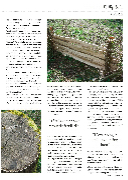Philip passionately believes children should be brought up playing in nature like he did, and that is a big part of the reason for opening up the forest. "Most people assume the woods look after themselves, and mostly they do, but long term things need to be done if you want to retain diversity and the historical features." As a result, he pays particular attention to taking care of the trees and woodland. A big part of this is coppicing, which involves cutting down tree stems to allow them to regrow shoots. Hopefully, they grow back in a way that provides good light to the woods and allows them to grow quicker and stronger . These shoots are perfect for making fences which gives good commercial value when it comes to selling them . "I'm passionate about preserving the ancient ecology," said Philip. "There's very little woodland like this left today, and, if it isn't managed properly, it will die out. I feel blessed to have been brought up here and play here all my life. I feel it's my duty to pass it on to the next generation in the best possible condition." Philip introduced me to Catherine the Oxford Sandy Black sow (nicknamed Catherine, Duchess of Oxford) and her litter of two-week-old piglets. He explained how he had heard about people experimenting by putting pigs back in woods, and went on a course to find out more and now has 'working ' pigs. They like eating brambles and weeds, so can be used to clear the woodland floor, and their piglets can be sold once they're big enough. Apparently it's a traditional method used since medieval times, and it's all part of Philip's aim to keep the woods in good condition through the years to come. "If it isn't managed properly, it will die out" Philip takes real care of the woods in all aspects. As we walked around, he could tell me about each plant, tree, bird and flower. He also told me about the way he splits wood to make fences and structures from it and saves it being wasted, and how it's good to have dead wood around to allow insects and small creatures to thrive. Following in his father's footsteps, Phillip is continuing the annual bluebell day, which is held over the May bank holiday weekend, and anyone can come and enjoy the woods . Bluebells are normally at the height of their season in May, so they'll be everywhere. I could already see the shoots coming up as we walked through the woods. Hollington Wood is something of a rarity nowadays, and it is amazing to have an area which is being protected and preserved so well in our local area. Philip hopes that others will catch on to the way he is preserving the woods, as he said, "I'm trying to develop a model here so that other people might look at their woods or woods they have access to and think 'we can do something like that.'" He is happy working everyday, come rain or shine, in the woods taking care of it. He doesn't see it as a job, just a way of improving and taking care of the woods. "I love doing it, and I love being here" The traditional Bluebell Day is on May 5th 2014. As per usual anyone can go wherever they like in the wood for the day. No admission charge, limited parking available on site. We will be feeding the pigs at 10am and 5pm for those of you who want to see them doing their job clearing the brambles. Philip Solt Sarah Wall Phonebox Magazine 39
